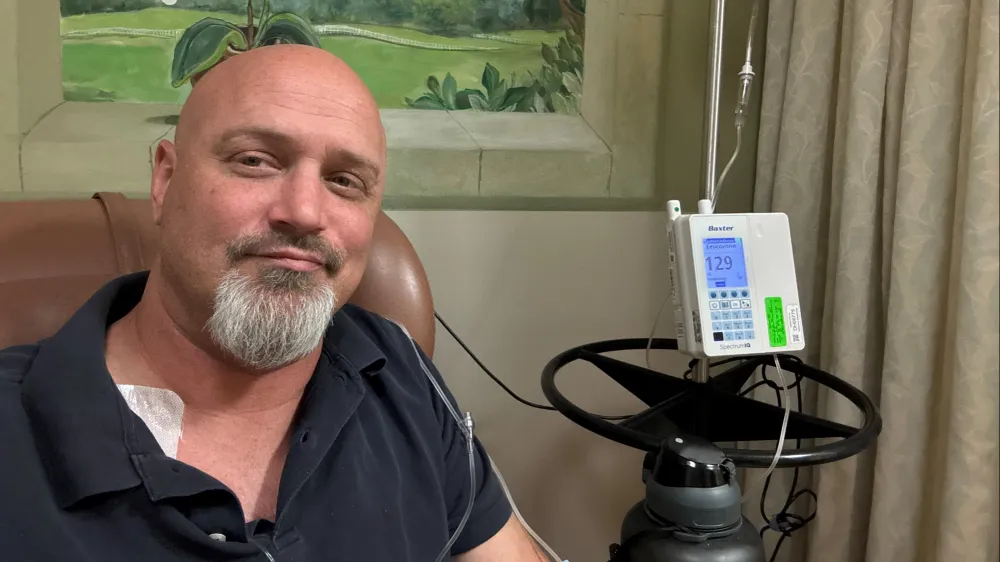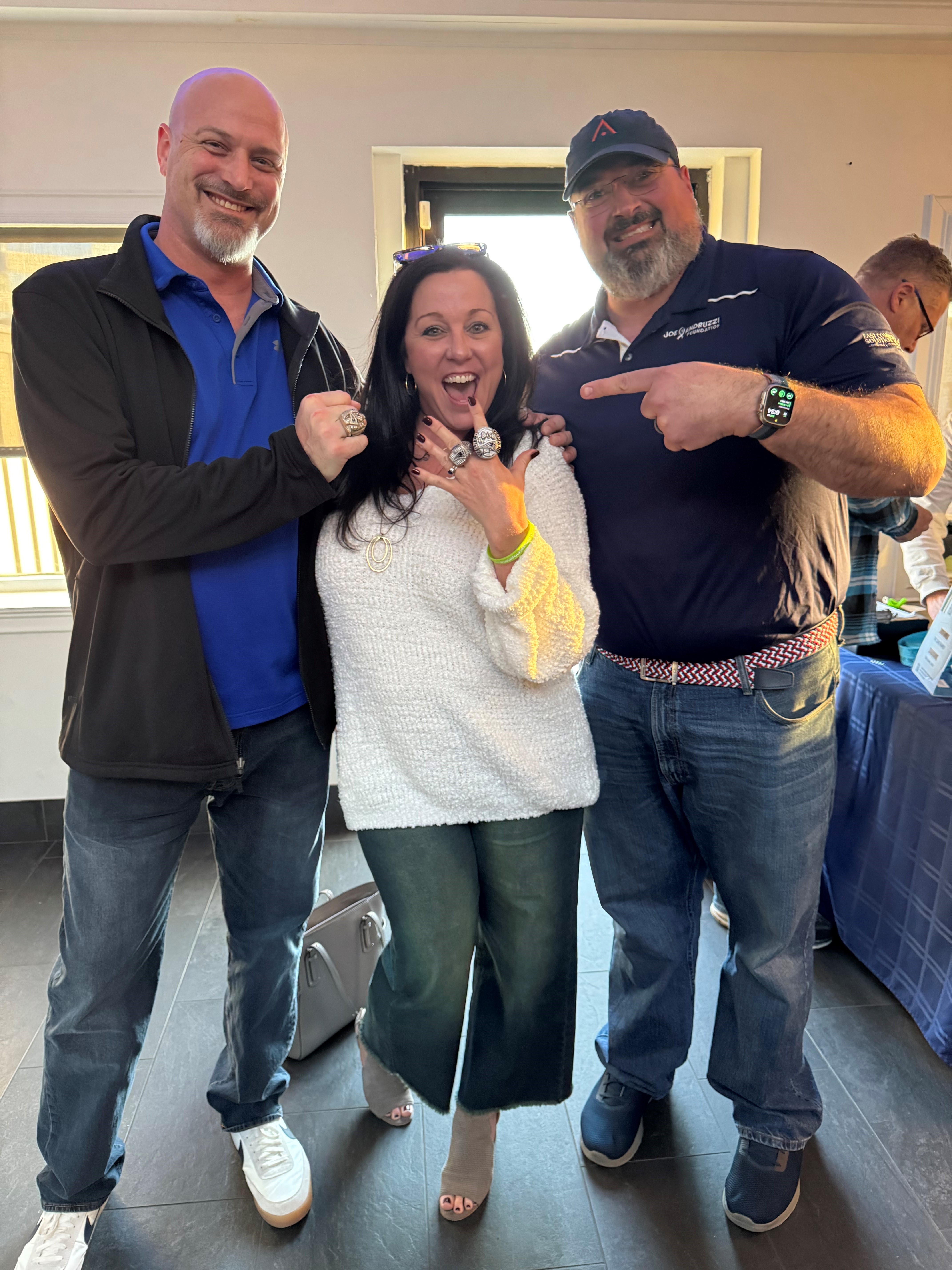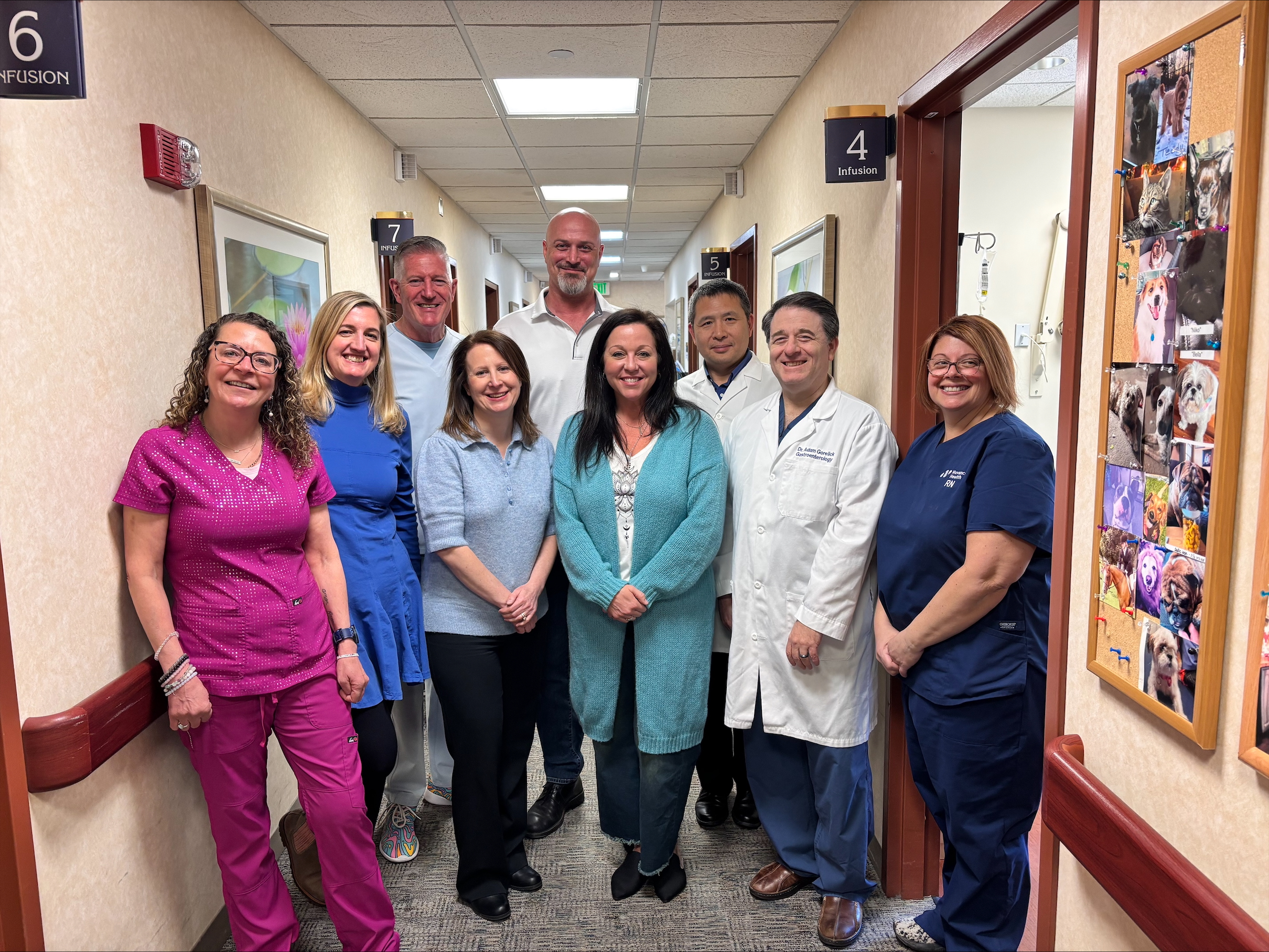Providing your location allows us to show you nearby locations and doctors.
Social worker faces advanced colorectal cancer with strength and support

06/10/2025
Diagnosed with stage 3 colorectal cancer while feeling healthy and symptom-free, Chris turned to expert treatment and unwavering support to take his life back.
Chris Gergovich, a 48-year-old clinical social worker from Newtown, Connecticut, never imagined a routine screening colonoscopy would uncover cancer — especially when he felt healthy and had no symptoms. Strong, active and committed to helping others through his work as a social worker, Chris had no reason to suspect anything was wrong — especially not advanced colorectal cancer.
Colonoscopy screening revealed advanced colorectal cancer
On November 2, 2024, a screening colonoscopy revealed three polyps in Chris’s colon. One appeared malignant.
“It hit me the next day: I had colon cancer and needed surgery and probably chemo,” Chris said. “Coming to terms with it was challenging. I was dumbfounded and shocked.”
Related content: Colon cancer: from symptoms to surgery and life after recovery
Moving quickly toward colorectal surgery
Despite the initial shock, Chris didn’t hesitate.
“I had no hesitation, no wait-and-see about treatment. I wanted to get it going right away,” he said.
He resumed care with Dr. Marc Casasanta, a colorectal surgeon at Danbury Hospital.
“Dr. Casasanta answered all my questions and was supportive. I knew I was in good hands,” Chris said.
On December 2, 2024, Dr. Casasanta performed robotic-assisted colorectal surgery to remove seven inches of Chris’ colon and 21 lymph nodes.
The tumor was in a favorable area, meaning Chris didn’t need a colostomy — a surgical opening (stoma) created in the abdomen to allow stool to exit into a bag outside the body. For many people with colorectal cancer, a colostomy may be temporary or permanent depending on the tumor’s location and other factors. Avoiding a colostomy can make a big difference in recovery and quality of life.
Dr. Casasanta used advanced robotic surgery technology to perform the bowel resection.
“We used the robot to perform the operation with small incisions, which made Chris’ recovery remarkably quick,” Dr. Casasanta said.
Robotic-assisted colorectal surgery provides enhanced precision, better visualization for the surgeon and faster recovery for patients. It often results in less pain, fewer complications and shorter hospital stays.
Related content: Danbury Hospital introduces new robotic-assisted surgery technology
“Chris had a great attitude the entire time, even when faced with the final pathology of stage 3 colorectal cancer. He was eager to get on to the next step and keep fighting,” Dr. Casasanta said.
Nutrition support after colorectal surgery
Following surgery, Chris needed to follow a low-residue, low-fiber diet — an adjustment made easier with the help of Pippa Purdy, a registered dietitian and oncology nutritionist at the Danbury Hospital Praxair Cancer Center.
“Pippa and my wife, Amy, had extended conversations about recipes and meals,” Chris said. “I could not have changed my diet without Pippa and Amy, the cook in the house.”
Related content: Nutrition tips for cancer survivors
Starting chemotherapy for colorectal cancer
Because of the cancer’s stage, Chris began chemotherapy just three weeks after surgery.
“It was a kick in the pants to need six months of chemo,” he said. “I was concerned it was advanced cancer, but I had full confidence in Dr. Ma.”
Dr. Eric Ma, a medical oncologist at the Danbury Hospital Praxair Cancer Center, oversaw Chris’ chemotherapy.
“Dr. Ma was esteemed and intelligible. He even checked on me when he was away at a conference,” Chris said. “I felt like he really cared about me, and my health was important to him.”
On December 27, Dr. Dahlia Plummer, a vascular surgeon at Danbury Hospital, placed a port to deliver chemotherapy at the new Vascular Access Center in Danbury.
A port is a small device implanted under the skin to make it easier for patients to receive long-term infusion treatments like chemotherapy. It allows for slow, controlled delivery and reduces the need for repeated needle sticks.
“Having chemo was challenging and daunting, but I knew it served a purpose,” Chris said. “I would take six months of difficult chemo to get 60 years of life — I plan to be a 108-year-old cancer survivor.”
Related content: What are types of colorectal cancer treatments?
Managing chemotherapy side effects and letting go of control
Chris said the first round of chemo went smoothly, but the cumulative effects eventually wore him down.
“I had no appetite and felt drained and nauseous after chemo,” he said.
Chris discovered frontloading calories before infusions helped manage his energy.
Always active and on the go, Chris had to slow down and listen to his body.
“I realized I could not be in control of the cancer, and I needed to let my doctors take the lead. The release of control was tough; the whole experience was eye-opening,” Chris said.
The Praxair Cancer Center nurses played a vital role in his recovery.
“The oncology nurses were accommodating and funny. They were genuinely interested in me and my health,” Chris said. “They were irreplaceable and essential to my recovery.”
He added, “The oncology nurses Jen, Jim and Melissa were amazing. They were very aware of me and prepared for any situation.”
Related content: Where to get help during cancer treatment and survivorship
Finding support and strength during colorectal cancer treatment
Amy DePaulo, a social worker at the Danbury Hospital Praxair Cancer Center, connected Chris with local and national support resources, including the Joe Andruzzi Foundation.
Having cancer was a humbling experience. At 6’5”, strong and independent, Chris said he was profoundly impacted by meeting Joe Andruzzi, a former NFL player and fellow advanced cancer survivor.
“Joe was warm and welcoming. We had an instant connection.”

Chris also deeply appreciated help from organizations like Ann’s Place and the Connecticut Cancer Foundation.
“I received gas and grocery gift cards, and support with my house payments,” he said. “I could conserve my energy and focus on getting better.”
A powerful network helped Chris cope with colorectal cancer
Chris said his strong support network carried him through.
“My wife, Amy, took care of everything. She managed all my appointments, and there were so many, from all the bloodwork and scans to nephrology, oncology, urology and more. She made sure I had all my medications,” he said. “Amy took it on like it was her cancer, too. I would not be where I am without her.”
His mother, a former critical care nurse, also helped after surgery. And people he didn’t expect showed up with care packages and words of encouragement.
“The dread I felt when I was first diagnosed has been replaced by how many people really care. It brought me together with so many people and opened my eyes to the support I have,” Chris said.
He also credits his three dogs: “They were my therapy dogs and part of my recovery team.”
Looking ahead after colorectal cancer
Chris is now close to his baseline health. While some days he still feels wiped out, “no one would be the wiser,” he said.
“Everyone says I look healthy and not wiped out. It lets me know I am doing the right things and gives me tremendous confidence.”
He looks forward to traveling again and getting back into a regular fitness routine. His experience has also deepened his empathy at work.
“It’s given me more perspective and widened the scope of my work,” Chris said. “I have a deeper appreciation for my clients with a cancer diagnosis. I’m able to relate on a more human level, build a rapport and have empathy.”
Related content: Adjusting to life after cancer treatment
Colorectal cancer screening and support matter
Chris is grateful for the quick action from his medical team — and for the love and support of those around him.
“Get your screening colonoscopies. Early detection is key. And if you have advanced cancer, know that even if treatment is aggressive, it’s worthwhile,” he said.
“Danbury Hospital has such a competent, capable and confident cancer care team,” Chris said. “They are exceptional and truly wonderful. They are like extended family.”
“I can’t sing the praises of Danbury Hospital, my wife, Amy, my family and support system enough,” he added. “All of these things are why I am beating cancer.”

Disclaimer: Outcomes from cancer treatment vary from person to person. No individual results should be seen as typical.